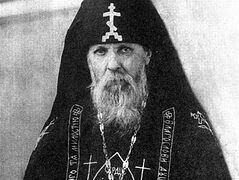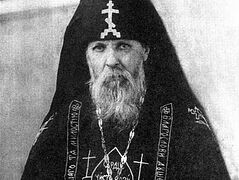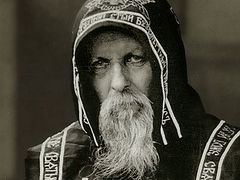God is wonderful in His saints!
Holy Father Seraphim of Vyritsa, pray to God for us, sinners!
The ascetic deeds of St. Seraphim of Vyritsa hold a special place in the present-day chronicles of the acts of pious men of faith. As a most pious of Orthodox layman, who in obedience prepared himself for monastic life under the guidance of seasoned spiritual mentors for over forty years; a monastic confessor, who took his monastic vows during the years of open persecutions and walked the path from a novice and sacristan to the role of the spiritual father of one of the largest Russian monasteries, offering guidance to a host of prominent hierarchs of the Russian Orthodox Church; a great elder who in his deeds fulfilled the legacy of the holy fathers: “Acquire the spirit of peace, and a thousand souls will be saved around you…”—such are the key milestones in the life of St. Seraphim of Vyritsa.
The frightful year of 1917… The Lord willed to send cruel times to Russia… “All around is treachery, cowardice, and deceit…” Even then, many wealthy people among the nobility, the intellectuals, and the merchants were transferring their capital to foreign banks and leaving Russia, hoping to wait out the dark times while living abroad.
Meanwhile, Vasily Nikolayevich Muravyov (St. Seraphim of Vyritsa’s secular name), a well-known fur trading merchant from St. Petersburg, did something unfathomable to ordinary human reasoning: He shut down his business, offered generous severance pay to all of his employees, and distributed the bulk of his capital to the needs of St. Alexander Nevsky Lavra, St. Petersburg’s Holy Resurrection-Novodevichy Convent, the Iveron Vyksun monastery in Nizhny Novgorod Province founded by Hieromonk Barnabas, his spiritual father and the elder of the Gethesmane skete of Holy Trinity-St. Sergius Lavra, as well as to other monasteries.
Vasily Nikolayevich had a highly profitable enterprise. Russian furs were in high demand in the western markets. His office conducted trade in Austria, Germany, Denmark, England, France, and even New York. Neither did the First World War hurt his business affairs, and Vasily Nikolayevich, a man of exceptional abilities, managed it as successfully as before.
He was known in the European capitals of Vienna, Berlin, and Warsaw as he visited them on business trips.
Success and reputation, wealth and beauty, physical health, and strong familial ties—these are earthly treasures that worldly people can only dream about. But the Muravyovs had received them by God’s bounty. God not only bestowed them, He also used them to test…
It seemed there was nothing to prevent Vasily Nikolayevich from investing his capital in another profitable business abroad, following in the footsteps of many of his acquaintances, and, safely escaping Russia, settling down with his family somewhere in the West. This would have promised them a peaceful and worry-free lifestyle.
However, there was no such choice for Vasily Nikolayevich. He was always ready to share any kind of trials with his beloved Motherland and his people. Moreover, the Lord prepared a special role for him…
The Lord Himself tells us about the free will of the human soul: If you want to be perfect, go, sell what you have and give to the poor, and you will have treasure in heaven; and come, follow Me (Matthew 19:21). If you want, said the Lord; and the faithful servant of God Vasily replied many times over in his heart: I want it, O Lord.
At the time, such a deed required the utmost courage and unshakeable faith. Renouncing all the pleasures of this world, with the mutual consent of his spouse, he made an irreversible decision to wholly dedicate his life to serving the One and Only God in prayer. The time drew near when the cherished desire to received monasticism, which he bore deep within his heart throughout his previous life, was about to be fulfilled…
And that day arrived! On October 16/29, 1920, at the Church of the Holy Spirit in the St. Alexander Nevsky Lavra, “Our brother is tonsured by the cutting of the hairs of his head as a sign of renunciation of the world and all that is of the world, and to cut off his own will and all bodily desires in the name of the Father, and the Son, and the Holy Spirit…” He was tonsured with the name Barnabas (he would later be tonsured Seraphim in Great Schema). At the same time, Olga Ivanovna Muravyova, his faithful wife and sister in the faith, was also tonsured a nun and given the name Christina (Seraphima in Great Schema) at the Voskresensky Novodevichy Convent in Petrograd. In 1920, taking his monastic vows at the St. Alexander Nevsky Lavra, elder Seraphim, later raised to a rank of a Hieromonk in Great Schema, became a father confessor to the Lavra’s monastics. Beginning from 1930, with the onset of a serious illness that lasted until he died in 1949, he resided in Vyritsa.
The years of service of the elder and ascetic of Vyritsa came during the period of bloody militant atheism, the Great Patriotic War, the post-war economic ruin, and reconstruction. From the onset of the Great Patriotic War, the elder increased his prayerful vigil on a rock, conducting it daily. By then, his illness had weakened him so much he was practically unable to walk unassisted. He was often armed or carried to his place of his prayerful vigil, as his attendants recall. Fr. Seraphim prayed as much as his strength would allow—for an hour, sometimes two, but occasionally he prayed for several hours at a time. He gave himself wholeheartedly and entirely to prayer—and it was as if he truly cried out to God!
We believe that through the prayers of ascetics such as St. Seraphim, Russia stood strong and St. Petersburg was saved. In cold or heat, wind or rain, the elder insisted on being assisted to his place of prayer vigil; despite his grievous health condition, he kept to his inconceivable ascetic deed of prayer for 1,000 days. So, day in and day out during those long and grueling wartime years, elder Seraphim of Vyritsa raised up his prayers for the salvation of his Motherland.
During those years, Father Seraphim bore witness to Christ with his life. He contributed immeasurably to the continued presence of Orthodoxy as a cornerstone in the Russian people’s existence, and brought a myriad of souls to salvation. For his great love towards his people, the Lord bestowed upon the ascetic of Vyritsa great spiritual wisdom, the salvific power of words that healed the spiritually infirm, and the message of true clairvoyance and prophesy. Just as during his life, Batiushka helps anyone who appeals to him now, after his repose.
Elder Hieroschemamonk Seraphim departed to eternal life on April 3, 1949. The Heavenly Jerusalem opened wide its gates to a new inhabitant, accepting him for all eternity in the Heavenly mansions.
“Come to my grave as if I were alive, talk to me as if I were still with you, and I will always help,” the Vyritsa elder used to say to many people back in his day.





